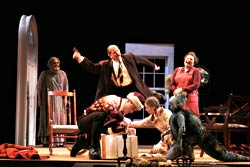Thornton Wilder was not a homespun regular guy but the weirdest great U.S. playwright. And The Skin of Our Teeth is his weirdest play, a chaos of vaudeville skits freighted with literary symbols and dark depths. It opens with a snowfall prettily portending an ice age in an ordinary New Jersey household. The ice age is also World War II—which, when Skin hit Broadway in 1942, it wasn’t clear we’d get through by the skin of our teeth.
Mr. Antrobus is late coming home from work (he invents things, like the wheel). The kids are vexing Mom—daughter Gladys flashes her panties, son Henry hits people with slingshots. The brassy maid, Sabina, dusts and schemes to marry Mr. A.
Director Bartlett Sher mostly saves the scary subtext for the postwar netherworld of the last act, concentrating at first on comfy comedy. The farce is funny—props to Kristin Flanders’ adenoidal turn as the unmaidenlike maid and Anne Scurria as the no-nonsense missus, as sturdily stentorian as Bea Arthur in Maud. The mammoth is cuddly, the dinosaur adorable. Mr. A at last comes home, and in Act 2 everybody plunges into the carnal carnival of an Atlantic City convention menaced by flood, and by the deluge of desire.
What saves the first two acts from superb superficiality is Howie Seago’s titanic performance as Mr. Antrobus. Seago is deaf. Other actors (mainly Laurence Ballard as Homer) voice his lines while Seago expresses them in swooping, soaring sign language involving his entire eloquent body. He’s a hulking presence with a hangdog R. Crumb mustache, cartoony boots, and a pinstripe suit as oversized as his yearning libido. “The world stands moment to moment on the razor-edge of danger,” he signs at one point—and so, too, does his thrillingly risky role.
Doubling Wilder’s lines for sight and sound enhances their impact, and it’s important thematically. Wilder is all about doubleness. He was haunted by his stillborn identical twin, and his true self was a shadow self. He defied death—when Skin opened, he was off winning a Bronze Star—but he was a sad sot whose secret lover said he was afraid of passion. Like the Jews who strenuously buried their ethnicity and invented Hollywood as an utterly goyische fantasy world, Wilder crafted fables of old-time family life, celebrating the eternal virtues of everyday averageness. War hero, king of Broadway and Hollywood, the only writer to win a Pulitzer for both drama and literature, he was an insider who felt like an alien anthropologist. He didn’t live in our town.
It’s tricky to stage Wilder, because while fear, sex, and death are the throbbing hidden engine of his drama, his morals are so primly conventional that one recently appeared on a Kellogg’s Raisin Bran box. Even his experimentalism is unsubversive. The actors in Skin directly address the audience, even complain about the play they’re in—Flanders does it wonderfully—but Wilder is the anti-Brecht. He wants to reassure and reassert middle-class virtues, swear fealty to a life that excluded him.
His greatest work circa 1942 isn’t the platitudinously scattered Skin but his focused screenplay for Hitchcock’s Shadow of a Doubt, about a serial killer sexually menacing his sweet teen niece. In the original, the killer was an old guy, like Antrobus, who rips off his benign mask and tells her, “Do you know if you ripped off the fronts of houses you’d find swine?”
Skin places unusual demands on a set designer, and Michael Yeargan delivers, taking us from the Antrobus home, a platform teetering over an icy void, to the lurid moral horror of an Atlantic City Shriners convention to the last act’s blighted warscape, with the backstage area gaping like an open wound inflicted on traditional stagecraft. Catherine Zuber’s voluptuously colorful costumes both capture and lampoon Norman Rockwell period nostalgia. It all works together well: teenage Gladys’ scarlet stockings that shock her dad; the red-striped tents where Mr. Antrobus’ vows are undone; fortune-teller Kate Wisniewski’s eerie green Schiaparelli swirls; the way the snowflakes in the first scene rhyme with the stars at the end, when Sabina steps out of farce character like Prospero renouncing his magic.
It is that last act that makes the play, and the production, great. Wilder and Sher rip off the mask of propriety and show us a world smashed to otherworldliness by violence unleashed. Or was it sex? Stumbling shell-shocked around the bare stage, Mrs. A and Sabina have somehow become allies, as unconcerned with erotic rivalries as the angels. It’s like they each found their twin.









